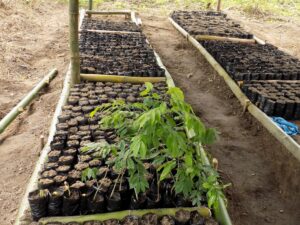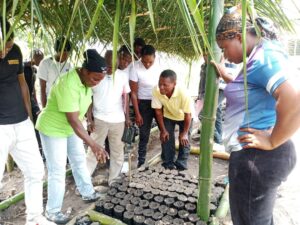Community Women Embraces Forest Conservation in Cross River through FAO Supported Project

Some of the tree nurseries raised by participants at the 2-day workshop in Iko Esai
Women resident in Iko Esai community of Akamkpa local government area, Cross River State, have been trained to conserve and regenerate the forest through raising tree nurseries as alternative source of income.
The women, who form part of the community forest guards known as Eco-Guards, were trained alongside their male colleagues by a non-profit environmental conservation known as Panacea for Developmental and Infrastructural Challenges for Africa Initiative. (PADIC – Africa) formally known as Development Concern (DEVCON) with support from United Nations Food and Agriculture Organisation (FAO).
The women were taught different techniques used to grow tree seedlings or nurseries and generating income from the sales of the seedlings as well as alternative ways of engaging in subsistence farming in an effort to protect the forest against degradation.
After the two days training session ,the women expressed confidence that the training would enable them generate income to feed their families and in the process contribute to Significantly regenerate degraded forest land in their community
One of the participants, Kokomma Okorie said “the training will impact my life for good because the trees planted in this nursery would be used in the future to plant where old trees have been felled and selling what I have would give me money to train my children and care of other needs. Besides, when I do not have time to go to my farm, I can go to the nursery, take ready trees and make sales.”
Another woman known as Janet Etim said, “the nursery will help me when I am in need” and “I can easily go to the nursery, harvest my crops, which I also planted for my family, and sell to get some money if the trees are not yet mature for sale.”
The Forest Officer in charge of Iko Esai, Eperem and Owai communities, Mrs. Rose Ekpo, who represented the Cross River State Forestry Commission, commended PADIC-Africa for its interventions in the communities.
Ekpo said that the Cross River State government was particularly interested in conserving its forest and was supportive of efforts geared towards achieving the desired goal.
According to her, mitigating the growing impact of climate change on the planet and humans especially demanded the collaborative effort of the forest communities.
“If you look around, you will notice that many things are happening including climate change. We have a lot of gully erosion and in some places streams and rivers are drying up. So, we are trying to raise nurseries to fill all the degraded areas within the forest. We are replacing trees that have either been sawed off by timber dealers or cut down by farmers. We can even use the nurseries as ornamental trees. Although they are indigenous species, by planting them on the road side will give shade and protection from the heat during the dry season, besides beautifying the environment,” Ekpo said.
She further noted, “When we talk about deforestation, it is not only about timber exploitation. It involves certain farming activities. Yes, some farming activities do more harm. For instance, a timber dealer would extract mature tree and allow others to grow, but a farmer will clear everything, even go as far as excavating the grass that may end up causing erosion.
“Most of the areas are destroyed to the points that even the very crops they clear the land for, do not grow well in such areas. So, it is not good for one to depend on a particular business, this nursery activities can help them generate a revenue for themselves and family,” she advised the participants.
In a remark, the Program Assistant of PADIC-Africa, Mr. Obongha Oguni said that the training was focused on assisting the selected community members of Iko Esai to raise nurseries of indigenous species, which could be used to restore degraded areas of the Cross River forest.
Oguni also stated that the nurseries would increase the already core conservation areas from two to four thousand hectares, noting “these people (Iko Esai) have about two thousand hectares of forest area that they are conserving. But, they have a core area of four hundred hectares and with increase in population and quest for food and agricultural expansion; we want to see that we can increase the core area from four hundred hectares to more. The essence of this development is to raise those seeds indigenous to the community and expand the conservation area.
“This project is being funded by the United Nations Food and Agriculture Organization (FAO), Economic Community of West African States (ECOWAS) and Sweden. PADIC-Africa happens to be the only organization that succeeded in this call in Nigeria among other NGOs in other African countries. It is an eighteen months program and we started officially in June.
“Besides establishing 2000 indigenous tree seed nurseries, 3000 improved variety seedlings of bush mango (Irvingia Gabonensis) will be provided by FAO for planting in deforested farm lands to enrich the forest cover and provide additional income to farmers at the long term”. the PADIC-Africa PA stated.

During a practical work on the second day of the 2-day workshop in raising tree nurseries in Ikoi Esai community
Thank you so much for sharing this wonderful inspiring story that shows how women can participate in and benefit from tree planting and forest restoration efforts! It’s great to read the direct quotations from women on the ground to better understand their perspectives. I hope this can be a sustainable activity for women in the community. Good luck with the planting and next steps!